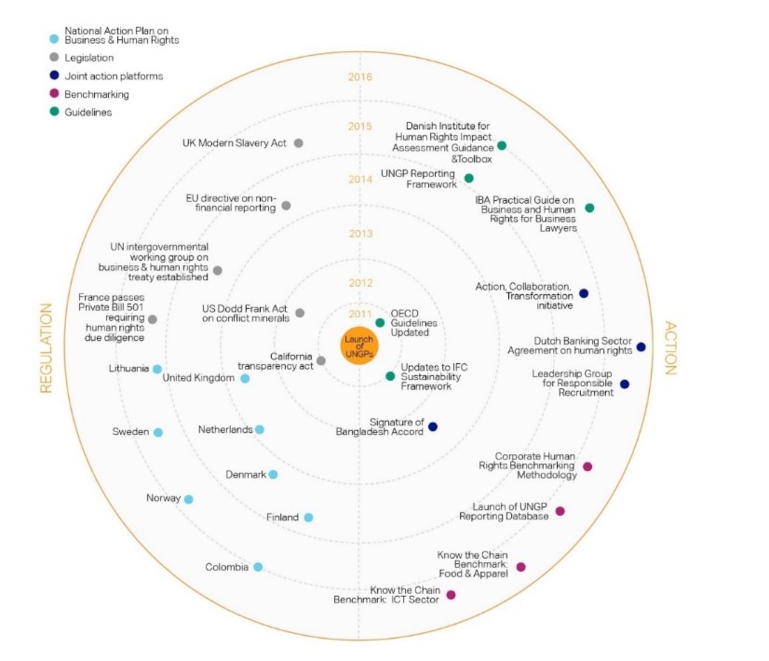Authors
Peter Bakker
Planet, people, peace, prosperity and partnerships. These are the “five Ps” that form the foundation of the Sustainable Development Goals (SDGs).
Over the past few weeks there’s been a global focus on the planetary “p”, with crucial dialogues on climate change taking place at COP22 in Marrakesh. In parallel, important discussions on the “people” front were the focus of the fifth UN Forum for Business and Human Rights in Geneva from 14-16 November.
The Forum is the world’s largest annual gathering on business and human rights, and 2016 is a landmark year. It is five years since the UN Human Rights Council endorsed the Guiding Principles on Business and Human Rights (UNGPs) in 2011.
This framework established an authoritative global standard on the roles of businesses and governments in helping to ensure that companies respect human rights in their operations and through their business relationships.
On this fifth anniversary, WBCSD has published a short issue brief highlighting some of the key developments that have characterized the business and human rights landscape since the UNGPs were launched.
Our research shows that the work of embedding the UNGPs into corporate practice is maturing quickly, driven by an evolving regulatory environment, an enhanced scrutiny of business performance and an increasingly widespread array of guidance, frameworks and toolkits (for more detail, see the graphic at the end of this article).
This issue brief also highlights the pivotal role that corporate respect for human rights must play in the realization of the SDGs. This idea was underlined during the UN Forum, most notably by Professor John Ruggie, author of the UNGPs, during his opening keynote address:
“For business to fully realize its contribution to sustainable development, it must put efforts to advance respect for human rights at the heart of the people part of sustainable development.”
This idea of how human rights interacts with the SDG agenda is also the topic of a new report authored by our partner organization Shift and published by the Business & Sustainable Development Commission. The report stresses that there is no more pressing or more powerful way for business to accelerate social development than by driving respect for human rights across value chains.
The progress that has been made on the business and human rights agenda over the past five years is encouraging. Of course, there are sizeable challenges to overcome, but many companies are now moving to embed the UNGPs into their enterprises.
Why are businesses doing this? The reasons are different for every company of course, but the leaders in this area recognize that respecting human rights is good for business.
Many companies are responding to the growing expectations of investors, business partners and governments, who are increasingly asking hard questions of global businesses and incorporating respect for human rights into relevant policies, standards and regulations.
Others are responding to the growing risk of reputational harm which is associated with adverse human rights impacts.
In some sectors, there is a growing recognition of the commercial costs associated with failing to manage these issues, such as operational inefficiencies in supply chains and the operational costs of conflict with local communities in the extractives sector.
For other businesses, it is simply about ‘doing the right thing’ and ensuring that their social footprint is aligned with core corporate values.
The challenge that many businesses now face is around how to translate policy into practice, in order to ensure that decision-making at the corporate level positively impacts the lives of vulnerable people, who are often at the far end of supply chains.
Through our human rights business solution, WBCSD member companies are committed to scaling up action on the UNGPs. This work program advocates for business action to prevent, mitigate and address human rights impacts, while bringing companies together to identify shared barriers and disseminate and collaborate on solutions. It also looks to bring the voice of forward-thinking business into intergovernmental processes and regulation.
In this way, our member companies are working to scale and spread tangible solutions in this challenging field.
This work enhances companies’ capacity to know and show that they are respecting human rights – and this is a responsibility that stands to make a critical contribution towards the broader vision of peaceful and inclusive societies embraced by the SDGs.

(Notable landmarks across the business and human rights landscape 2011 – 2016.)
WBCSD news articles and insights may be republished in accordance with the Creative Commons Attribution-NonCommercial-NoDerivatives 4.0 International Public License, and in accordance with our Privacy Policy. All Content must be featured with due credits.
